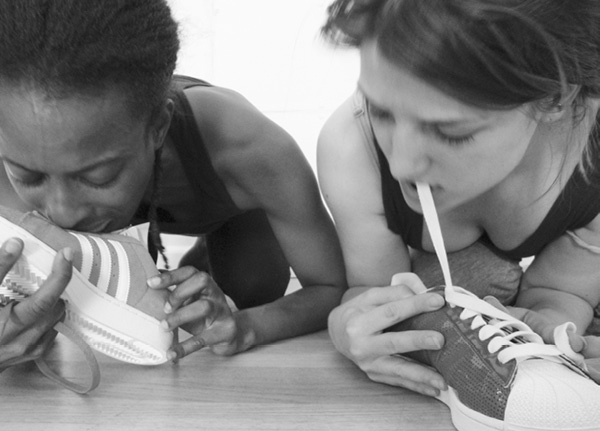
OWN,OWNED
first performed on September 26, 2012
Anita’s Way, New York, NY
performed three times in 2012
JESSE PHILLIPS-FEIN
Laura Alexander, A. Nia Austin-Edwards, Dasha Chapman, Tendayi Kuumba, Rachel Lane, Ben Lundberg, Gyrchel Moore, Efeya Sampson, EmmaGrace Skove-Epes, Jasmin Torrejon, Nadia Tykulsker, Kevin Farrell & Phil Rodriguez, Maya de Silva Chafe
Brooklyn, NY
682707687j682707687e682707687s682707687s682707687e682707687@682707687j682707687u682707687m682707687p682707687o682707687f682707687f682707687d682707687a682707687n682707687c682707687e682707687.682707687o682707687r682707687g
jumpoffdance.org
OWN,OWNED
JESSE PHILLIPS-FEIN
“own,Owned” engaged with the concepts of “hope” and “change” in the American political landscape of 2008-2012, which was characterized by euphoric enthusiasm and stifled depression, a quiet despair. The purpose of the work was to address the lingering effects of the 2008 Obama presidential campaign by interrogating the substance beneath its slogans—the significance of “branding” optimism, and the unrealistic expectation that a black president would fundamentally change the overall racial power structure in the United States. Dissecting how these terms (“hope” and “change”) are unfulfilled desires, the piece examined how they are constructed and controlled through forms of popular entertainment and consumerism. This work unpacked the aspirations for hope and change as a fantasy of racial harmony and reconciliation. Specifically, the piece showed the connections between marketing Blackness to make white people cool, and marketing Obama as a way to make white people absolved of racism (using choreography to RUN-DMC’s “My Adidas” intertwined with Nas’ “Black President” as an example).
More broadly, the work also looked at how these “political libidos” are re-programmed by entertainment and consumerism to manifest as desire for other things. Moving beyond the questions of whether or not the activities of consumption are superficial distractions or absorptions, the work embraced the possibility that small choices—from songs on a playlist to what hair care product we buy—provide a sense of meaningful control when people feel disempowered and overwhelmed. However, the choreography also pondered the effects of divorcing hope and change from actual power, exposing a collective lack of imagination.
The performance revolved around a female pair—one Black, one White—who attempted to confront each other throughout the piece. The nature of their relationship was fraught, competitive and distrustful, but they were also hungry for an alternative way to connect. Surrounded by a team of four masked performers meant to embody social forces—three white, one black—this team manipulated, seduced and impeded the pair in a variety of ways, including feeding them sneakers, smothering them in body care products, physically assaulting them, whispering, yelling, and caressing. Eventually, the team was unmasked, revealing how large social forces are bound up with individuals. The soundscape included samples from Obama’s campaign speeches, Superbowl commercials, number-one pop songs from 1979-2012, and a 1980s remake of Sam Cooke’s “Change is Gonna Come.”